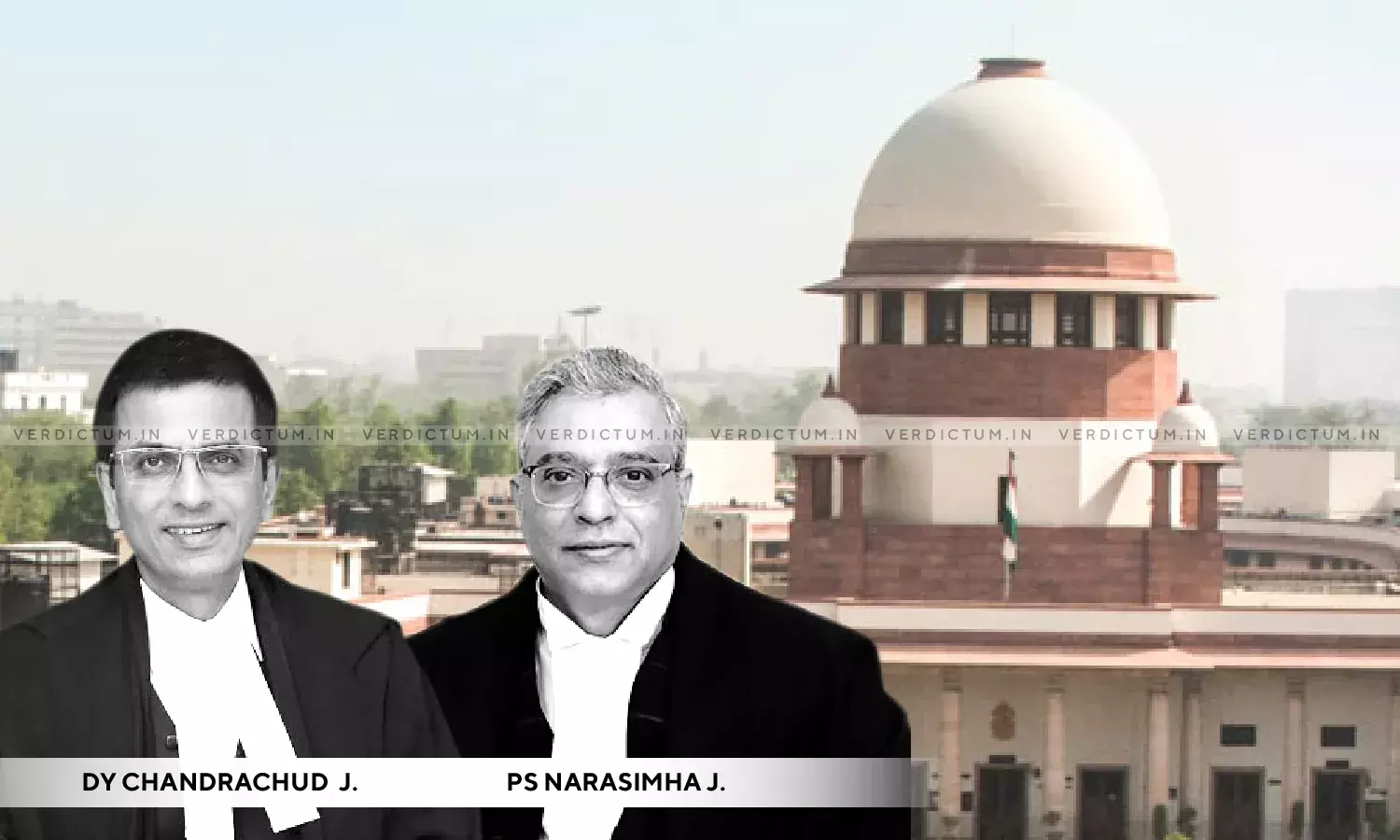Conciliation Proceedings U/s. 22-C Of Legal Services Authority Act are Mandatory In Nature – Supreme Court

A Supreme Court Bench of Justice Dr. DY Chandrachud and Justice PS Narasimha heard an Appeal that arose from a judgment passed by a Division Bench of the Karnataka High Court, regarding the procedure followed by the Permanent Lok Adalat while giving an award.
To that end, the Court held that "Section 22-C(8) is amply clear that it only comes into effect once an agreement under Section 22-C(7) has failed. The corollary of this is that the proposed terms of settlement under Section 22-C(7), and the conciliation proceedings preceding it, are mandatory. If Permanent Lok Adalats are allowed to bypass this step just because a party is absent, it would be tantamount to deciding disputes on their merit ex parte and issuing awards which will be final, binding and will be deemed to be decrees of civil courts. This was simply not the intention of the Parliament when it introduced the LSA Amendment Act. Its main goal was still the conciliation and settlement of disputes in relation to public utilities, with a decision on merits always being the last resort. Therefore, we hold that conciliation proceedings under Section 22-C of the LSA Act are mandatory in nature."
Mr. Rajesh Kumar Gautam appeared on behalf of the Appellant.
The dispute arose from an application filed by the Appellant Bank before the Permanent Lok Adalat under Section 22-C(1) of the Legal Services Authorities Act 1987. The application was filed against the Respondent and his guarantor, in regard to credit facilities availed by the Respondent from the Appellant Bank. The Appellant Bank alleged that the principal amount along with interest had not been repaid by the Respondent in spite of multiple notices and requests. Hence the Appellant Bank prayed for the recovery of the principal amount with interest and costs from the Respondent and his guarantor.
Notice was issued by the Permanent Lok Adalat to the Respondent. In its award, the Permanent Lok Adalat noted that the Respondent appeared through an advocate but did not participate in the proceedings, while his guarantor though served with notices did not participate in the proceedings. Further, it was noted that no conciliation was reported and hence the Permanent Lok Adalat allowed the application filed by the Appellant based on the documentary evidence adduced and directed the Respondent and his guarantor to pay the Appellant the principal amount with interest.
The appellant filed a Petition for the execution of the award of the Permanent Lok Adalat before the Civil Judge and Judicial Magistrate First Class. While the Appellant's execution petition was pending and upon the issuance of an arrest notice, the Respondent filed a Writ Petition under Article 226 of the Constitution, challenging the award of the Permanent Lok Adalat. The Single Judge allowed the Writ Petition, without issuing notice to the Appellant.
Relying on the judgment of the Single Judge of the High Court, the Appellant's execution petition was dismissed, and the Appellant alleged that only then did they become aware of the Single Judge's judgment.
Hence, the Appellant filed a Writ Appeal, which was dismissed by the Division Bench of the Karnataka High Court on two grounds – (i) the procedure for conciliation under Section 22-C of the LSA Act was not followed (ii) the Permanent Lok Adalat could not have acted as a regular civil court in adjudicating the proceedings.
Aggrieved, the Appellants moved before the Supreme Court.
The Supreme Court identified two issues from the Appeal.
(i) Whether under Section 22-C of the LSA Act conciliation proceedings are mandatory; and
(ii) Whether the Permanent Lok Adalats have adjudicatory functions under the LSA Act.
For the analysis of the first issue, the Supreme Court analyzed the step-by-step scheme provided in Section 22-C, by which it concluded that the Permanent Lok Adalats would proceed to adjudication of a dispute on its merits only after attempting and failing to generate a settlement between the parties. The same was also held in Bar Council of India v. Union of India, by which the constitutionality of Chapter VI-A of the LSA Act was upheld.
To that end, the Court opined that "If the party present before the Permanent Lok Adalat does not agree or if the absent party does not respond in a sufficient period of time, only then can the Permanent Lok Adalat adjudicate the dispute on its merits under Section 22-C(8).", while making it abundantly clear that Section 22-C(8) can only come into effect once an agreement under Section 22-C(7) fails.
Therefore, the Supreme Court held that conciliation proceedings under Section 22-C of the LSA Act are mandatory in nature.
For deciding the second issue, the Court placed reliance on a catena of judgments, including the case of United India Assurance Co. Ltd. v. Ajay Sinha & Ors. where the Court had observed that the Permanent Lok Adalat performs an adjudicatory role if the conciliation between the parties fails.
The Supreme Court finally held that the Division Bench of the High Court was incorrect in its observation that the Permanent Lok Adalat cannot act as a regular civil court in adjudicating the dispute between the parties while being correct in its observation that the Permanent Lok Adalat failed to follow the mandatory conciliation proceedings.
To that end, the Supreme Court opined that "the observations of the Division Bench in the impugned judgment in respect of the adjudicatory powers of the Permanent Lok Adalats were incorrect, while upholding its ultimate conclusion since the Permanent Lok Adalat failed to follow the mandatory conciliation proceedings in the present case. We make it clear that we have not made any observations on the merits of the dispute between the parties, and all rights and contentions of the parties are kept open."
Click here to read/download the Judgment

